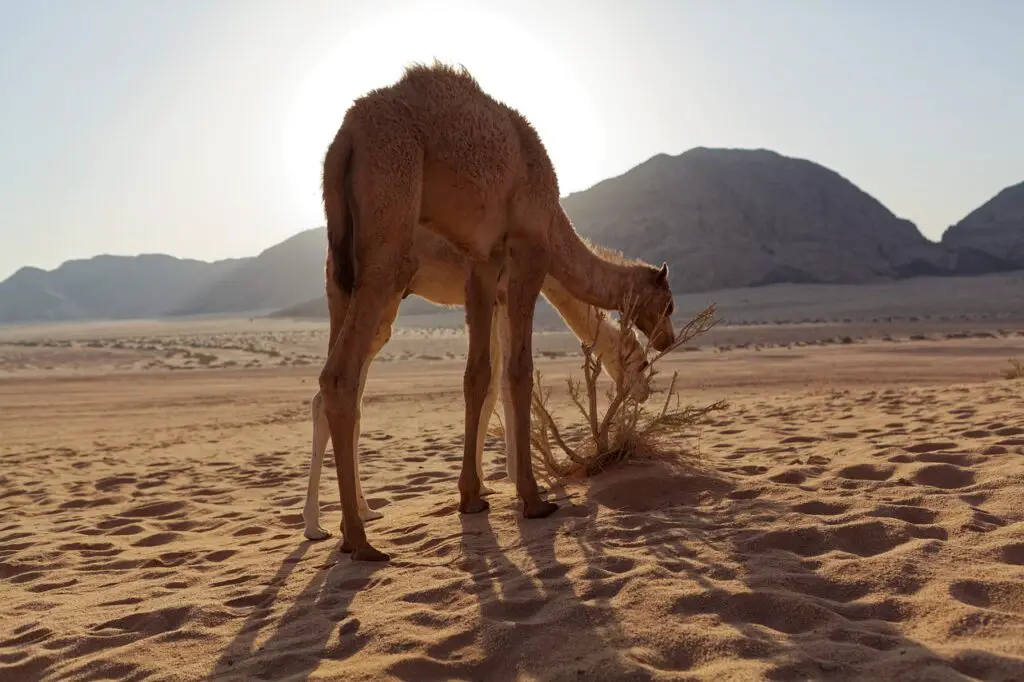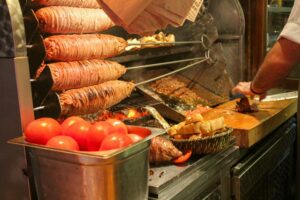Camel eating is a traditional Emirati meal that is typically only served for special occasions or to important guests.
It is an incredibly rare dish in the Middle East and is considered a delicacy.
The chefs who prepared the camel meal are originally from the South of India in Kerala but have been living in Dubai for over two decades.
The camel platter contains various ingredients, including spiced rice, cardamom, caramelized onions, and curry leaves.
The meat is usually cooked in a tandoor oven or over an open fire, giving it a unique smoky flavour.
Eating camel is considered a rare and luxurious experience that many are lucky to experience.
5 Places In Dubai Where You Can Eat Camel Meat
Camel-Milk Cookies At Camel Cookies
This brand, born in the UAE and operating a kiosk in The Dubai Mall, is appropriately named and offers a “taste of the Emirates”.
It aims to showcase the wonderful flavours in regional desserts not typically displayed by the many American dessert chains in Dubai.
Although camel milk is an ingredient in their cookies, it is not the main attraction. One particular cookie, similar to a Chicago deep-pan pizza in terms of indulgence, is filled with dates and saffron and should not be overlooked.
Camel Xiao Long Bao At New Shanghai
A brand-new casual Chinese restaurant in The Dubai Mall offers a unique dish that features camel meat in the form of slow-cooked mince wrapped in dumplings and steamed traditionally.
The dish is undoubtedly a must-try for adventurous food enthusiasts looking for an exceptional dining experience.
The slow-cooking process of the camel meat allows the meat to absorb all the flavours from the spices and seasonings added to the dish.
This results in a unique and bold flavour profile that will tantalize your taste buds.
Camel Tenderloin At Siraj
This upscale Emirati restaurant offers a dish featuring sautéed camel meat paired with hummus, but the meagre meat doesn’t do the dish justice.
Instead, opting for the tenderloin is recommended to fully appreciate the true flavour and texture of the camel meat.
The dish is accompanied by dry curried potatoes and a zaatar “pesto,” making it one of the more ambitious and expensive options on the menu.
While a hummus and camel meat dish is available, the tenderloin offers a better overall experience for those looking to indulge in this unique cuisine.
Camel Milk Cappucino At The Majlis
If you have an intolerance or simply want a healthier option than cow’s milk, The Majlis offers a variety of camel milk products.
In addition to camel milk beverages, they sell pre-packaged camel milk chocolates, making unique and interesting gifts to bring back home.
The bakery features cakes infused with camel milk, and they even have camel milk ice cream.
“Nomad” Camel Burger At Bareburger
The Nomad is a standout item on Bareburger’s organic menu, featuring a delicious camel burger that stands out from the rest.
Despite the tendency for camel burgers to be dry and unappetizing, the Nomad is a generous portion and retains impressive moisture due to the low-fat content of the meat.
This delectable burger includes a combination of wild camel, fried egg, aged cheddar, fried onions, habanero, and dill pickles mayo sandwiched between a brioche bun.
Despite the flavorful toppings, the quality of the camel meat is still noticeable, making the Nomad a must-try for adventurous foodies.
Do Individuals Consume Camel Meat In The UAE?
For a significant period, camel meat has been an essential component of Emirati cuisine, and its milk has provided sustenance to the Bedouins.
Even today, camel meat is a well-liked delicacy served during special events like Eid and National Day.
It is a significant part of Emirati culture and a symbol of hospitality. Despite the availability of other meat options, camel meat has maintained its popularity due to its distinct taste.
It is slightly salty and similar to beef but with a unique flavour. The Emirati people take pride in their rich culinary heritage, which includes the preparation of camel meat dishes.
Is It Acceptable To Consume Meat From Camels?
Camel meat is a promising option to serve as a substitute for red meat across the world, considering its nutritional similarity to conventional meat sources.
It presents certain benefits like decreased intramuscular fat, increased iron content, and reduced cholesterol, exceeding that of lamb or beef.
Therefore, camel meat’s viability as a global alternative for human consumption is considerable, owing to its similar nutritional profile to traditional meat sources and its specific advantages that make it a potentially healthier choice.
Therefore, it can be a healthy and nutritious option for people looking for a meat alternative.
What Is The Price Per Kilogram Of Camel Meat In The UAE?
Camel meat is a popular dish in the United Arab Emirates, and its price varies depending on different factors.
On average, the cost of camel meat in the UAE is around AED 11.82 per kilogram, which is subject to change due to location, season, and demand.
While this price range can be used as a helpful reference for individuals considering purchasing camel meat, it is important to note that prices may differ based on the specific cut of meat and the quality of the product.
The cost of camel meat in the UAE remains relatively affordable compared to other types of meat, making it a popular choice for locals and tourists.
Is Mutton Inferior To Camel Meat?
Camel meat is a highly nutritious food with an impressive array of essential vitamins and minerals.
Compared to other commonly consumed meats such as beef, mutton, and poultry, camel meat is significantly richer in certain vitamins.
It contains high levels of vitamin C, a powerful antioxidant essential for maintaining healthy skin and immune function.
Camel meat is also a rich source of B vitamins, including pyridoxine (B6), niacin (B3), cobalamin (B12), and biotin (B7), which play a vital role in energy production, cell metabolism, and brain function.
Camel meat is a good source of vitamin D, which is important for strong bones, teeth, and vitamin E.
Conclusion
Eating camel in Dubai is not only possible, but it is also a unique cultural experience.
Camel meat is a popular delicacy in the United Arab Emirates and is widely available in restaurants and supermarkets.
It is also considered a healthier option as it is low in fat and protein.
However, it is important to ensure that camel meat is sourced from licensed and reputable suppliers to ensure food safety.
Visitors to Dubai should embrace the opportunity to try camel meat and other local delicacies to fully immerse themselves in this fascinating city’s cultural experience.








